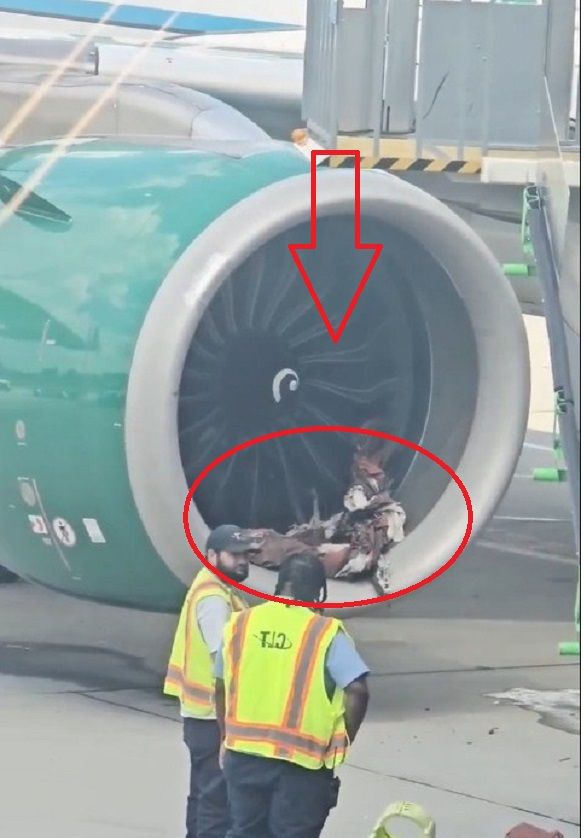On August 16, 2025, what began as an ordinary day at Charlotte Douglas International Airport quickly turned into a stressful and unusual disruption when a Frontier Airlines Airbus A320 suffered engine damage during ground operations, leaving passengers stranded for nearly nine hours and sparking widespread discussion about aviation safety and the risks of ground support equipment.

The flight in question was Frontier Airlines F93134, scheduled to depart Charlotte for LaGuardia Airport in New York, using an Airbus A320-251N registered as N365FR, which had earlier arrived from Philadelphia. After the first group of passengers disembarked, ground crews began preparing the plane for its next journey, and as part of routine pre-departure procedures, an external air-conditioning hose was connected to help regulate cabin temperature while the aircraft sat at the gate. These hoses are common pieces of equipment that allow planes to maintain passenger comfort without relying solely on onboard systems.
However, during ground operations, the immense suction force produced by the aircraft’s CFMI LEAP-1A26 engine reportedly pulled the hose into the intake. Within seconds, the hose was shredded, leaving debris behind and raising immediate concerns about whether the engine had sustained internal damage. Ground crews reacted instantly, halting all operations around the aircraft, and the plane was quickly grounded until inspections could be completed. This decisive response ensured that the incident did not escalate into anything more dangerous, but it meant that the aircraft was taken out of service indefinitely. For passengers, the sudden removal of the plane created a long and exhausting delay.
What should have been a routine trip to New York turned into an extended wait at the airport as Frontier scrambled to find a replacement aircraft. Coordinating the availability of another plane, reassigning crew, and preparing the aircraft for boarding was a time-consuming process, stretching the delay to nearly nine hours. Passengers expressed understandable frustration, but the airline emphasized that safety could never be compromised for the sake of schedule. Boarding a plane with potential engine damage was not an option. Eventually, a substitute aircraft was secured, and the travelers continued their journey to LaGuardia, though much later than expected.
The Airbus A320neo involved in the incident had been in service since June 2019 and was known for efficiency and reduced environmental impact thanks to its advanced LEAP-1A26 engines. However, these powerful engines also produce tremendous suction forces even at low settings, making ground safety protocols essential.
@trendy_viewz Frontier Airlines Airbus A320-251N aircraft (N365FR) left engine ingested a ground air-conditioning hose at Charlotte Douglas International Airport #aircraft #FrontierAirlines #Airbus #planedisaster ♬ original sound – Trendy_viewz
In fact, this was a textbook case of why airlines implement strict procedures to ensure support equipment remains at a safe distance when engines are running. While some initial reports mistakenly identified the aircraft as an A321, it was later confirmed to be an A320. In aviation, precise details matter, since accurate records are essential for maintenance tracking, regulatory compliance, and safety reporting.
For the passengers stuck in Charlotte, the experience was draining, as long delays in airports can be both physically and emotionally taxing. Many had onward connections and important plans disrupted, and nine hours in limbo tested patience. Still, most travelers acknowledged that safety was more important than punctuality. Frontier staff provided updates throughout the day and worked to assist passengers while preparing the replacement aircraft. From a technical standpoint, the ingestion of the hose was a serious issue. Aircraft engines are extremely sensitive and among the most expensive parts of a plane. Even minor foreign object damage can lead to costly inspections, repairs, or part replacements.
While the shredded hose may not have been as dangerous as metallic debris, it could still cause significant internal wear or blockages, which justified the decision to ground the aircraft immediately. Beyond the maintenance concerns, the grounding had operational consequences. One plane being taken out of service can disrupt multiple flights across an airline’s network. In this case, Frontier’s quick action in sourcing a replacement minimized the ripple effect of delays across its schedule, though those on flight F93134 still bore the brunt of the inconvenience. This incident also highlighted the importance of ramp safety.
Airport ramps are fast-paced environments where refueling, baggage loading, catering, cleaning, and safety checks all occur in a limited timeframe. Each task must be carefully coordinated, and even routine equipment like air-conditioning hoses can present risks under the wrong circumstances. Aviation safety depends on both technology and human discipline, and every member of the ground crew has a role in ensuring safe operations. Frontier’s response was in line with FAA regulations, which require inspections after any suspected damage. By immediately grounding the aircraft, the airline demonstrated its commitment to passenger safety over schedule adherence. While the delay was frustrating, the decision prevented what could have been a much more serious outcome.
For the aviation industry, the event provided valuable lessons about the constant vigilance needed to prevent foreign object damage, one of the most common risks in ground operations. For passengers, it served as a reminder that flight delays, while inconvenient, are sometimes necessary to ensure safety. Ultimately, the August 16 incident at Charlotte Douglas International Airport showed that while air travel is one of the safest forms of transportation, unexpected challenges can arise, and what matters most is how airlines respond. Frontier contained the situation quickly, avoided injuries, and got passengers to their destination safely, reinforcing the guiding principle of aviation: safety always comes first.





